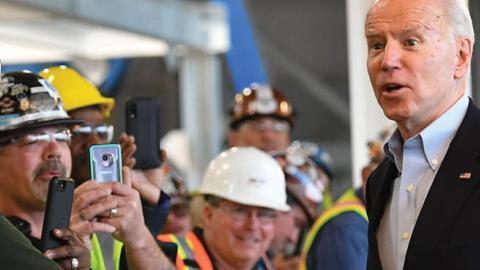Amid all the confusion caused by the coronavirus and the usual noise of the campaign season, Joe Biden wants to make one thing clear: He is focused on helping the middle class, particularly union workers. “ Middle Class Joe ” wants to “build back better” from the pandemic by ensuring “the future is made in America,” particularly by “newly empowered labor unions.” His desire to support unions is so transparently sincere that it is curious he has chosen to run on policies that may well bring disaster to them — at least in the private sector.
To be sure, some of Biden’s plans should bring more workers into unions — for a time. He pledges to stuff his economic-recovery legislation with rules that will reclassify gig workers as employees, effectively end secret ballots for votes on unionizing job sites, raise minimum wages to make union laborers cost-competitive, and neuter state and local “right to work” laws. These have been high on many union organizers’ wish lists for years and would make a Biden administration much more union-friendly than was Obama’s. Most or all of these union gains, however, are likely to be effectively canceled out by the effect of other policies on his agenda that would destroy the very jobs he will have spent so much taxpayer money to create.
The Trump administration’s focus on trade has drawn the nation’s attention away from a major contributor to the decline of blue-collar manufacturing work in the United States: technological change. Manufacturing’s share of the total U.S. economy has barely changed since the end of World War II, but manufacturing employment plummeted from one-third of the workforce to less than one-tenth. Unlike in the long era after the industrial revolution took off — a period in which economies transitioned from making simpler goods such as textiles to complex machines such as automobiles that required substantial manpower to assemble — automation is not generating new industrial jobs to replace the ones it destroys. The trend now is increasingly for workers to oversee and repair the machines that produce the actual products. For the reasons I discuss below, Biden’s policies will accelerate this change, and many union workers are likely to be left behind.
One of his signature goals is to make the United States “lead the world in manufacturing electric vehicles.” By issuing rebates to trade in old gas-powered cars for new ones, building hundreds of thousands of electric charging stations across the country, and converting the federal government’s fleet to electric vehicles, Biden expects to create 1 million jobs. He will be disappointed.
Last fall, the United Auto Workers — which has endorsed Biden — went on strike, in part because of the danger posed by the electric vehicles Biden is now promoting. Tens of thousands of autoworkers around the world lost their jobs in 2019 as their companies retooled for building electric cars. Biden’s spending plans could help offset those costs, but not the far greater danger that workers will face once the new production lines are operating.
Electric vehicles will gut autoworkers’ and mechanics’ unions by driving their members out of work. Electric drive trains consist of a mere fraction of the parts of their gas-powered equivalents, and the vehicles are much easier to assemble. Ford estimates that electric cars will require 30 percent less labor in their auto plants, and other industry projections are even more drastic. Fewer moving parts mean fewer repairs too, threatening mechanics’ livelihoods, and charging cars at home will drive gas stations out of business. By putting the government’s weight behind electric vehicles, Biden will make those jobs disappear even faster.
He also plans to turn the U.S. into a green-energy leader by building more wind turbines and solar panels domestically and making the power grid carbon-free by 2035. These changes will further erode manufacturing. Although some renewables can produce energy as inexpensively as natural gas or other low-cost competitors, they do not provide the predictable and reliable energy supply needed in a modern society. Solar and wind require either a reliable fossil-fuel backup or a way to store energy for use on cloudy or wind-free days. The amount of backup capacity needed boggles the mind: Stanford professor Mark Jacobson’s influential renewable-energy plan depends on the United States building more reserve power capacity than the entire existing grid. Energy return on investment measures how much more energy a power source generates than is required to build and operate it, and the science is settled: Returns from renewables are (for now) abysmal.
After accounting for the facilities needed to store energy until it is used, most renewables cannot produce enough to become economically effective. Solar can do so in very specific circumstances, but by a margin slim enough that relying on it would be foolhardy. One team of scientists studying the matter discovered that converting an entire economy to renewables would slash the total energy return on investment by more than half, to levels that “are well below the thresholds identified in the literature required to sustain industrial complex societies.” As they noted, “the results obtained put into question the consistence and viability of the Green Growth narrative.” As American energy becomes scarcer and thus more expensive, power-hungry factories and steelworks will be the first on the chopping block, and their workforces with them.
New infrastructure spending and measures to make existing buildings more ecofriendly are not likely to help construction workers nearly as much as the Biden campaign supposes, either. President Obama made similar promises about the “shovel-ready” jobs in his stimulus bill, only to discover “there’s no such thing as shovel-ready projects” in the U.S. legal and regulatory environment. “Sheriff Joe ” should remember this, since he oversaw the bill’s implementation. Union workers do, though: Some in California demonstrated against the Green New Deal, and the AFL-CIO has expressed considerable skepticism. Although Biden’s platform is not nearly as draconian as that of his party’s radicals, he intends to lead U.S. manufacturing in the same direction.
Climate change is a difficult challenge and will only get harder to address as the increasing pace of automation penetrates and disrupts the U.S. economy. But however popular these green projects are with big-money donors and activists, they will hurt the people most that Biden is most passionate about helping.
Read in National Review

















